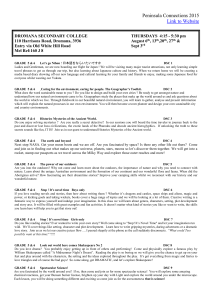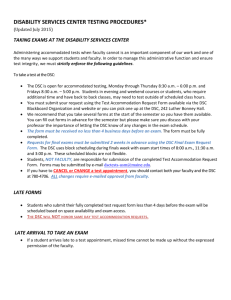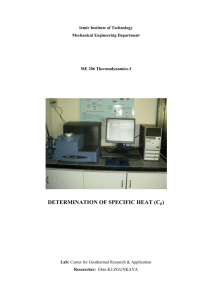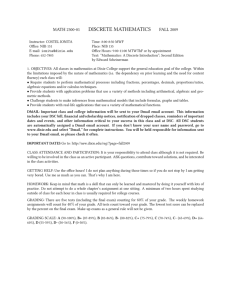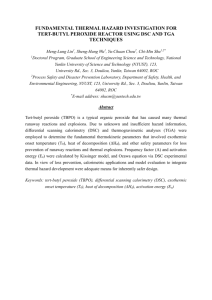Reflections and Achievements Presentations
advertisement
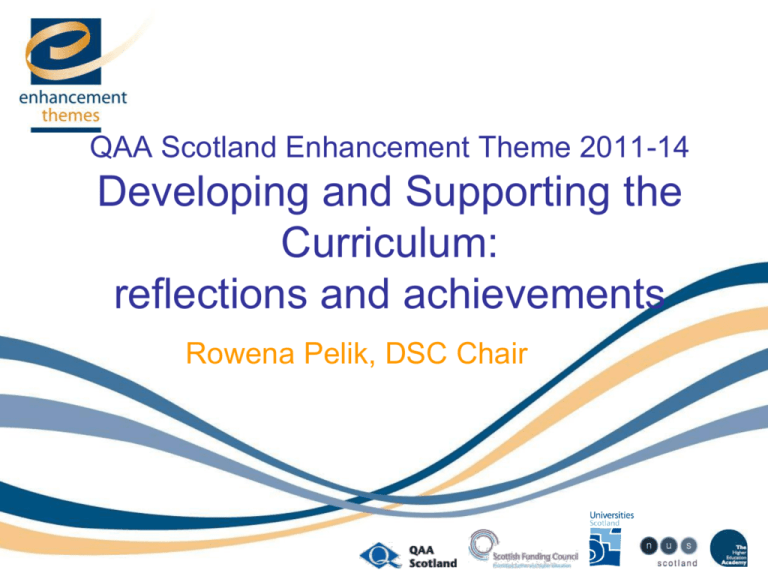
QAA Scotland Enhancement Theme 2011-14 Developing and Supporting the Curriculum: reflections and achievements Rowena Pelik, DSC Chair DSC: what have we achieved? Outline • National level: key questions, phases and topics • Institutional work and approaches • The theme as indicative of enhancement in Scotland • Questions Early work - framing and scoping DSC topics within institutions: CfE “The University established a Curriculum for Excellence short life working group to establish current knowledge of and engagement with CfE across the institution... Schools have developed their own action plans following the group’s recommendations. Abertay has been very active at a national level with CfE...” “[Dundee has] also created a Curriculum for Excellence booklet: http://www.dundee.ac.uk/cfe/lib/doc/cfe%20booklet.pdf and sent copies to every secondary school and college in Scotland. This booklet was accompanied by a letter offering individual visits to schools in order to discuss CfE with pupils and teachers. This has been well received.” DSC topics within institutions: CfE “Staff Information Sessions and online guidance have updated and involved staff in preparations for CfE ‘Senior Phase’ implementation. Discussions and Programme Leader workshops have been held to promote revision of first year curricula more closely to match the needs and requirements of CfE students. In this context, all admission statements now reflect the CfE.” [GCU] “St Andrews held an Open Forum on CfE attended by 70 delegates from the university, local schools and Education Scotland.” “a half-day symposium on 17 June to bring together key stakeholders, including schools, colleges, local authorities, Education Scotland and the SQA, and University Staff. We hope these stakeholders will all contribute to shaping our developing institutional understanding of CfE.” [Dundee] DSC topics within institutions Staff: enhancing teaching “Through.. AcceleRATE CPD (Learning and Teaching) Framework we now offer internal professional recognition ... This has hugely increased the engagement of staff across the institution... The theme has focused our attention on the need to celebrate staff engagement and achievement in learning and teaching. Over the last three years we now have learning and teaching feature in our University magazine, an expanded annual Learning and Teaching Showcase, introduced our Principal’s Awards for Learning and Teaching and expanded our range of Caledonian Associates and Scholars CPD opportunities. This has resulted in an increase in our staff who are professionally recognised and a tangible sense of a growing community centred around learning and teaching.” [GCU] DSC topics within institutions Staff: enhancing teaching “The work undertaken in developing learning and teaching and in exploring the future development of the curriculum has highlighted the need to ensure that our teaching staff are both effectively supported in their own development needs and that high-quality teaching and leadership in learning and teaching is more explicitly valued, recognised and rewarded.” [Edinburgh] “we .. use[d] some of the resource available to accelerate the development of a University CPD scheme aligned with the UKPSF. Without this resource, this important development for the support and recognition of staff would have taken much longer.” [QMU] DSC topics within institutions The flexible curriculum “Significant work is ongoing ... at Abertay currently as the flexible curriculum features strongly in the new TLE strategy.” “the process of developing and sharing the Flexible Curriculum Toolkit and the Staff Enhancing Teaching work has been enormously beneficial as a focus for leaning and institutional reflection on these specific areas of practice and development.” [OU] “the annual Programme Leaders event focused this year on the three strands of the DSC and engaged staff in evaluating the QAA Curriculum Design Toolkit.” [GCU] DSC at work in institutions DSC at work in institutions: supporting innovation and change Seed-corn funding was used very purposefully: “The Projects for the Enhancement of Teaching and Learning initiative was set up... • To disseminate ET work already done and encourage staff and students to engage with it • To stimulate further development of ET activities • To involve students as partners in ET work • To showcase good and innovative practice in a range of subject disciplines/programmes.” [Queen Margaret University] “The aim of the small-scale projects funded under the DSC theme has been to engage a range of staff and enable them to progress areas of work that are innovative and related to their own interests...” [UWS] DSC at work in institutions: supporting innovation and change “This seed-corn funding not only supports staff development but also enables changes to the curriculum to support and enhance the student experience.” [Aberdeen] “we wanted to raise the profile of the institutional and sector-wide work undertaken in relation to the Themes... [including] by creating a University of Dundee Enhancement Fund to provide seed-corn funding for small-scale projects.” “QAA enhancement funding at Heriot-Watt is distributed to teams of lecturers and students following a Call for project proposals. Proposals are considered by a panel, and funding is allocated on the basis of relevance to the QAA theme, innovation and the individual project’s potential for impact.” DSC at work in institutions: some projects and activities “Innovative approaches to involving service users in Health and Social Care curriculum delivery. Produced a series of podcasts, including interviews with service users and carers, used to enhance student learning and prepare students for practice learning placements.” [Open University, Scotland] Three sample funded projects from Heriot Watt: • Social Media for Enhanced Learning and Teaching in Engineering • Production of short online videos for non-specialist audiences – an alternative assessment method (Built Environment) • Live Learning – pioneering inter-campus live studio design projects through hand held tablet computers “Using senior students to support junior students in practical classes in Physiotherapy” [QMU] DSC projects in institutions “‘Digital student selves’ Exploring strategies for learning and creating online” [GSA] “[A] project enabled an existing model of interprofessional education in health and social care to be further evolved... By deepening understanding of one profession’s specific needs, the curriculum for three further courses has been enhanced... The project has provided real evidence.. of the ways in which interdisciplinary teams can add value to student learning and help to prepare students for the interprofessional worlds in which they will practice.” [RGU] “Undergraduate History conference – a national conference organised and hosted by UG history students. Outputs included a conference publication.” [St Andrews] DSC projects in institutions “Education Excellence Fund.. funded projects.. have enabled the building of collaborative relationships across the university and.. encouraged and supported the creation and development of innovative learning and teaching activity.” [Strathclyde] “The development of online diagnostic tests for engineering maths using the DEWIS e-assessment system project addresses a need to provide more support to engineering students who enter 3rd year after completing an HND at College.” [Aberdeen] Three indicative examples of funded projects from Dundee: • A game for learning basic concepts in molecular biology and evolution • Social space, learning tool or both? Student perspectives on the use of social media in higher education • Improving integration of, and academic skills amongst, international doctoral students ‘ DSC embodying enhancement: collaborative and collegiate working Collaboration within institutions: “A key characteristic in our approach has been in the development of ‘partnership working’ with significant involvement of students and staff drawn from all levels and roles (academic and support) from across the University.” [Edinburgh] “History skills workshops: proposed, developed and facilitated by postgraduate students in History for sub-honours students, helping to develop research skills in UGs and curriculum design and teaching skills in PGs” [St. Andrews] DSC embodying enhancement: collaborative and collegiate working Thinking collaboratively: “The ‘Aberdeen workshops for student-led co-operative enterprises’ project aims to lend pedagogical support to studentled enterprise initiatives using workshops to ensure that students become more aware of the opportunities to learn from organisations such as Co-operative Education Trust Scotland and Co-operative Development Scotland.” “Project teams were formed and enabled to take forward their own innovative ideas in highly focussed, low-cost, collaborative projects which aimed to implement new practices and enhancements for curriculum design and staff/student support; those involved came from across academic schools and professional services.” HWU DSC embodying enhancement: collaborative and collegiate working Collaboration between institutions: “Our inspirED seminar series has been a useful vehicle to support staff engagement with DSC.. and has included input from a range of colleagues from across the sector including Cathy Bovill on coconstruction of the curriculum; Keith Smyth on technology enhanced learning within the curriculum; and Roni Bamber on the ‘curriculum review route map’. All of these seminars have attracted excellent attendance from.. across the institution and have also supported a positive impact on practice.” [Dundee] “Linking outcomes into curriculum development ... particularly a cross-institutional collaborative project undertaken by the Universities of Glasgow, Birmingham, Nottingham, and Edinburgh known as the LEAF Project: Leading Enhancement in Assessment and Feedback.” [Glasgow] DSC embodying enhancement: collaborative and collegiate working Collaboration between institutions: “Our initiatives involve or have led to the involvement of working in partnership with other Universities... this approach has significant potential to accelerate the pace of effective development with the commensurate improvement to the quality of the student experience - e.g... the setting up of a Scottish Network for universities currently exploring the use of Transforming the Experience of Students through Assessment (TESTA) audits with Glasgow, Dundee, Edinburgh Napier and Robert Gordon University” [Edinburgh] DSC embodying enhancement: internationally informed and outward-looking “All of the projects draw on knowledge and practices that are outwith Heriot-Watt. For example, the project proposals are informed by relevant, peer-reviewed scholarly literature and project teams link with a range of external organisations, through collaborations with international industry partners, external professional organisations, learned bodies and academic networks. Among those are networks facilitated by QAA to disseminate the work of other universities in enhancing the curriculum.” “the enhancement theme has provided us with a framework to benchmark and share our thinking and ideas for re-designing and shaping our new curriculum and evaluating its delivery” RCS DSC embodying enhancement: internationally informed and outward-looking “Enhancement of marine science research and teaching linkages at Heriot-Watt campuses: Edinburgh, Orkney, Dubai, Malaysia” [HWU] “HSC Social Pedagogies. This project stimulates HSC curriculum development in the area of social pedagogies. Working with colleagues in Trondheim University in Norway the project considers the ways in which this approach can be applied in a UK context.” [OU] DSC embodying enhancement: in partnership with our students “Student engagement with the Theme has been one of our proudest achievements... if students are asked to tell us, or show us, how they think their curriculum can be enhanced, developed and supported, they will not only do so, but will do it in imaginative and creative ways” St Andrews “30% of the project proposals we funded under the Theme were student-led or involved students carrying out the main activity; half of these..were entirely proposed, led and completed by students... [And] students were an invaluable part of staff-led projects, working alongside staff in order to develop new pedagogical or professional initiatives.” St Andrews “‘Developing and Supporting the Curriculum’ is something that is done by students, as much as by staff” St Andrews DSC embodying enhancement: in partnership with our students “DSC funding has been used to support the Students’ Association to investigate how students engage with their studies; this is due to report in early Autumn 2014... [and] to support the Annual Student-led conference.” [UWS] “Particular emphasis has been placed upon increasing student engagement in our enhancement agenda, and our success is visibly evident in EduFair 2014 (Stirling’s internal learning and teaching conference), where 71% of sessions have been offered either solely by students or jointly with staff.” [Stirling] DSC embodying enhancement: in partnership with our students “We specifically required academic staff to work with an undergraduate student on these projects.” Adding: “academics could use the funding to do a more detailed piece of work than they would otherwise have had the capacity to do. As a result these projects have provided incredibly useful resources that will have a long-lasting effect on subsequent students.” [Aberdeen] “[DSC supported the Students’ Association’s] first Education Week, a series of events aimed at raising students’ awareness of the different aspects of their learning experience... [this] initiative is designed to empower students to meaningfully participate in shaping their learning experience, particularly through programme and curriculum design.” [GCU] DSC: achieving institutional impact “The DSC Enhancement Theme has provided a conceptual structure through which GCU has radically overhauled and refreshed the design of the curriculum.” GCU “over the period of this Theme the L & T culture at HWU has developed to one that is able to draw on peer-led and supported initiatives, where the development of learning cultures is seen as an on-going achievement.” “[Our] iterative and consultative development towards a stated position on curriculum change we believe to be an essential component of our strategic approach to ensuring student and staff commitment to what will be a significant culture shift for all.” Edinburgh DSC: achieving intuitional impact “DSC.. offered a real opportunity for The Open University in Scotland to explore and articulate the unique contribution that the university makes to developing and delivering the HE curriculum to a diverse student body... It opened up space for us to draw together existing work and thinking, to consider areas where we have particular strengths and insights into curriculum development and delivery ... Crucially, it also offered space to explore key challenges and emerging innovations in a sectorwide context, supporting productive collaboration with colleagues in other institutions considering similar practical and policy challenges.” DSC: achieving institutional impact DSC “has made a significant impact on RGU. It has underpinned and enabled new curriculum development and enhancement in very significant ways in support of our aspirations for a high quality teaching and learning experience for students. It has also enabled us to develop further a tool, in CDI, that has real potential to continue to encourage interdisciplinarity.” “Curriculum for the 21st century... has formed the backbone of UHI’s response to DSC” “At the start of the DSC theme, the intention was to engage a wide group of staff with the work of the theme, and to support work that was related to the continued development of the UWS Learning, Teaching & Assessment Strategy. To date 28 small-scale projects have been funded, with 3 areas supported through larger-scale funding.” Questions? Enhancement Themes website: www.enhancementthemes.ac.uk The Quality Assurance Agency for Higher Education. Registered charity numbers 1062746 and SC037786

